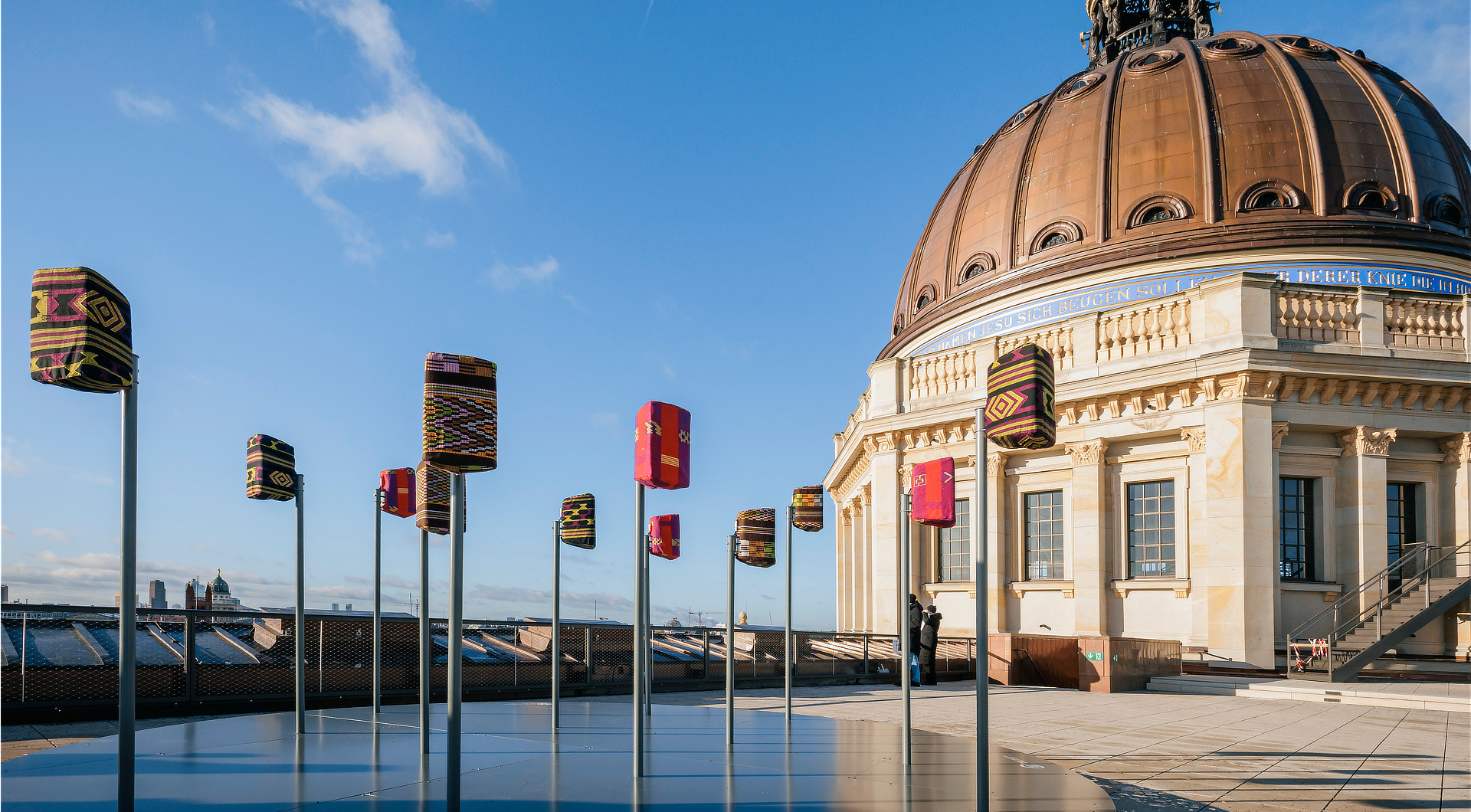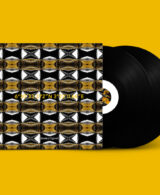
by Ugochukwu-Smooth C. Nzewi.
Emeka Ogboh’s multi-sensory practice considers what the late Senegalese humanist Alioune Diop referred to as Presence Africain, the necessity to affirm the history and humanity of the African person on the global stage following centuries of negation by Western imperialism. Since moving to Berlin in 2014, Ogboh has explored the cartography of the African presence in Europe through tangible and intangible cultural artefacts such as language, gastronomy, memory, and more recently, African objects in exile. In late 2020, he partnered with Dresden’s Museum für Völkerkunde on a poster campaign throughout the city of Dresden that featured the five storied Benin bronzes in the Museum’s collection with the text “Vermisst in Benin” to amplify the ongoing debates on the restitution of African artefacts. Acquired in London between 1899 and 1904, the five sculptures were part of the treasures from precolonial Benin Kingdom looted by British forces during the infamous punitive expedition in 1897. Balkanized and auctioned off, the looted treasures have since surfaced in European and North American collections. For Ogboh, the repatriation dialogue has been an academic exercise and ineffective in returning the stolen artefacts to their rightful owners. His campaign injects a desired urgency by taking the conversation to the public square. In doing so, he draws attention to the presence of the objects in Europe and simultaneously affirms their absence in contemporary Nigeria to amplify the lingering trauma of colonial violence (conquest, plunder, confiscation, and expropriation). It is in this light that we must approach his commission for the new Humboldt Forum.
Titled The Cosmos – Things Fall Apart, Ogboh’s multi-channel sound installation comprises twelve loudspeakers covered in a type of African textile called akwétè from which a new chorale performance of Igbo folkloric song interspersed with spoken words are transmitted. The installation is placed on a circular platform and situated in proximity to the golden cross on the top of the dome of the new Humboldt Forum’s cupola on the reconstructed facade. The newly opened edifice maintains fidelity to the original 18th century neoclassical palace of the Prussian monarchy and includes inscriptions on the cupola and above the portals and iconography of monarchy such as crowns, eagles, and coats of arms. The Humboldt Forum has divided opinion because of its complex history as a site of imperial power. From being the palace of the Hohenzollerns, the Prince-Electors of the Holy Roman Empire in the 1470s; the permanent residence of the Elector of Elector of Brandenburg who became King of Prussia in 1701; the seat of German Empire in 1871; to the end of the monarchy in 1918 when the Weimar Republic emerged. Arguably, the reconstructed building on this contested site evokes nostalgia, which as Svetlana Boym reminds us, “produces subjective visions of afflicted imagination that tend to colonize the realm of politics, history and everyday perception.”[1]
Taking into consideration, Monika Grütters, Minister of State for Culture, during the opening of the Humboldt Forum, explained that “we are handing over to the public … a new type of museum that, in the spirit of the Humboldt brothers, creates a tangible experience of the traditions of the Enlightenment and the ideal of peaceful dialogue between cultures.”[2] The new Humboldt Forum is imagined as a cosmopolitan space of global cross-cultural dialogue and exchange. Germany is entitled to its usable past and in this case, one that evokes nostalgic trappings of what was once a great imperial hope. What it cannot do, however, is efface the generational distress that it produced in the “spirit of curiosity, rather than one of rejection or denigration.”[3] The descendants of subjects of empire must have ownership of their history and make it present at the Humboldt Forum and arrive at catharsis on their own terms.
The Prussian philosopher and linguist Wilhelm von Humboldt’s fascination with language as an art form is a reference point for Ogboh whose recent sound installations draw upon world’s oral cultures. In this instance, the artist seeks recourse in a culture he has a first-hand knowledge, his native Igbo. “Nne Nne Udu” which the chorale composition is based is a classic Igbo folkloric song with a moralizing narrative. It is a story of a young maiden who is entrusted with a treasured clay pot. On the way to the stream to fetch water with the pot she trips and the pot falls and breaks into pieces. The broken pot affects the maiden’s psychological wellbeing and that of her community. It is a metaphorical story that highlights how actions (positive or negative) could have unintended or far-reaching consequences. Ogboh infuses the chorale performance with chants in the great Igbo tradition of mbem, an oratory art form that recalls West African griots, inspired by a statement by the protagonist Okonkwo in Chinua Achebe’s Things Fall Apart: “He has put a knife on the things that held us together and we have fallen apart (176).”[4] Africa’s most significant modern novel, arguably, Things Fall Apart offers an ethnographic account of the Igbo society at the moment of the colonial encounter. As Achebe describes it, reefing W. B. Yeats’s The Second Coming, “Things Fall Apart, the Center cannot hold. Mere Anarchy is loose upon the land (n.p).”[5]
The Cosmos – Things Fall Apart focuses our attention on what is hidden behind icons and symbolic gestures when the past and present collides. The location of the work near the cupola is a jarring juxtaposition that belies a complex history. The cross, a Christian symbol, signals Germany’s history as a Christian nation and at the same time as a tool of colonial domination in what Europe referred to as its civilizing mission of a barbaric non-Western world including Africa. It is often the case that it is easier to reflect on the compound effects of European colonialism on the structure and fabric of African societies because the impact is tangible. People of different ethnicities were merged, countries were formed, alien systems of governance were imposed, and people were encouraged to become “civilized humans.” End of story. Largely unaccounted is the deep psychological and mental scars that succeeding generations of Africans have contended with since the infamous Berlin conference of 1884. The enduring result is that they process their self-worth, their sense of and being in the world, through the White gaze. This is the larger story of colonial violence in Africa and what it does to the human spirit: You are forced to think outside of your being, your imaginings of the world are made possible outside of your cultural self.
Mired in deep history, Ogboh approaches the folkloric song as a metaphor of what happens when a people’s cosmic anchor, their access to the supernatural or otherworldly, is violated, truncated and replaced with a strange medium or foreign spiritual force. The center can no longer hold. Ogboh trains our eyes on the old rugged cross as an emblem of spiritual colonization. In the Old Testament, Yaweh’s insists that “thou shalt have no other gods before me.”[6] This first command of the Ten Commandment was the basis on which Europe unmoored several societies in colonial Africa from their belief systems. The second command “thou shalt not make unto thee any graven image, or any likeness of anything that is in heaven above, or that is in the earth beneath, or that is in the water under the earth”[7]became the basis on which votive objects, conduits to supernatural forces, were desacralized and ironically, expropriated as museum objects. One could imagine that all gods are jealous and perhaps Africa’s messy postcolonial condition, the result of this transfer of affection to foreign gods, is a lesson from neglected gods for, how shalt they be responsive in a strange land.
In shining a critical light on the deep psychological impact of colonial violence, Ogboh opens a space for a real conversation and dialogue. As the writer Chimamanda Adichie reiterated in her keynote speech at the opening of the Humbodlt Forum, “we cannot be dismissive of a belief system because it is merely unfamiliar to us just as we cannot be dismissive of history because we are uncomfortable with it.”[8] Ogboh’s work insists that the past is not in the past if it continues to shape present conditions. In other words, trauma is an open wound which truth and perhaps responsive restitution can ameliorate.
[1] Svetlana Boym, “Nostalgia and its Discontents,” The Hedgehog Review Vol. 9, No. 2 (2007):7-18
[2] Monika Grütters, “Speech by Minister of State Monika Grütters, Federal Government Commissioner for Culture and the Media, at the opening of the West Wing of the Humboldt Forum,” September 22, 2021. https://www.bundesregierung.de/breg-de/bundesregierung/staatsministerin-fuer-kultur-und-medien/aktuelles/speech-by-minister-of-state-monika-gruetters-federal-government-commissioner-for-culture-and-the-media-at-the-opening-of-the-west-wing-of-the-humboldt-forum-1962496
[3] Ibid.
[4] Chinua Achebe, Things Fall Apart (London: Heinemann, 1959, Rpt., New York: Penguin Books, 2017)
[5] Ibid
[6] Exodus 20: 3-5 KJV
[7] Ibid
[8] Chimamanda Adichie, “Keynote speech,” September 22, 2021. https://www.humboldtforum.org/en/programm/digitales-angebot/digital-en/keynote-spreech-by-chimamanda-adichie-32892/


